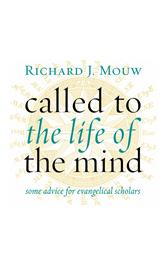Perspective on Intellectual Pursuits

Pursuing an active life of the mind offers both intriguing possibilities and inevitable perils. The study of church history is no exception to this reality. Those who have engaged in the exploration of the past know what a fascinating world it holds and yet also the danger that an overwhelming mass of artifacts and writings might bury the historian.
In Called to the Life of the Mind: Some Advice for Evangelical Scholars (Eerdmans, 2014), Richard Mouw offers some perspective to those delving into intellectual endeavors. This short book of seventy-four pages includes nineteen “chapters”—perhaps better called “reflections”—on the work of scholarship. For busy evangelical professors, researchers, and doctoral students, this format offers an opportunity to steal away for a few minutes and think about the craft of scholarship.
Some of these reflections will be more or less helpful depending on the person. I want to share a few thoughts that I found particularly beneficial.
From the first page, Mouw reminds us that anti-intellectualism still plagues some corners of evangelicalism, something he had to overcome from his childhood church community. The drive for studies to have an instant pragmatic payoff can quickly and unwittingly undermine the very goals of study by short-circuiting the intellectual process, a process that requires time and reflection. While a bit of a luxury, time for research nonetheless can both benefit the church and glorify God. It can have value as “a good in itself”—a phrase Mouw borrows from John Henry Newman (1801–1890).
Consider this reflection:
If, then, our young scientist is especially gifted in theoretical chemistry [I might insert the field of church history here as well], she might do well to work diligently in that field. We ought to want a world in which that kind of knowledge is valued. It is a good thing simply to cultivate insights into the deep patterns of God’s creation—and doing it as people who have been called to love what God has created. (18)
Here Mouw raises the value of intellectual inquiry as a way of understanding and loving God’s creation, which ought to lead us to understand and love God himself.
A second reflection I found refreshing was Mouw’s awareness of the unique challenges that face scholars. For one, Mouw acknowledges that in scholarship, “loneliness is more often than not the name of the game” (47). He voices some of the frustrations of scholarly work as one who has clearly walked this path, issues such as “spending hours trying to solve an intellectual puzzle or to find the right sentence to start off a chapter” and “[w]orrying about how to be kind in reviewing a book that you think is pretty bad” (48).
Mouw recommends that collegiality and community with other researchers can both address this loneliness and provide scholars with a sounding board, but he doesn’t lead readers astray to think that they can avoid it altogether. As evangelical scholars, we endure this loneliness as part of our calling to serve God, his world, and his church.
Finally, the theme that drives Mouw’s book is the tension between “epistemic hope” and “epistemic humility”—two phrases he borrows from twentieth-century evangelical philosopher and Wheaton College professor Arthur Holmes (1924–2011). Recognizing our limits as finite beings while taking in the wide scope of our subject matter (just think how expansive church history is alone!) should humble us in our pursuits of knowledge. But such a humility need not end in despair. Rather, a knowledge of God as the Creator who is drawing all things together for his ultimate purposes reminds us that we can do our part now and leave what remains undone in his hands. In a word, we can hope.
Mouw captures these ideas with this charge:
If we effectively appropriate these attitudes—humility and hope—we can display the kind of patience that is capable of tolerating complexities and living with seemingly unconnected particularities without giving in to despair or cynicism. To show forth this kind of approach to intellectual complexities is to perform an important ministry—Christ-like ministry—in the present-day academy. (71)
Called to the Life of the Mind offers applicable insights for the tenured professor, the aspiring doctoral student, the adjunct teacher, and the independent scholar. All of these individuals make their own contributions to our collective knowledge and can do so with gratitude for the smaller or larger role they play in serving Christ and his church through teaching and writing. As Mouw reminds us, scholarly goals are best pursued when set in perspective of humility in human limitations and hope in God’s sovereign and certain purposes.

